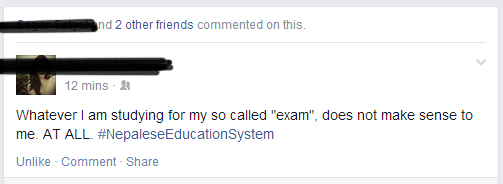Umes Shrestha
I am a teacher who likes being very liberal while checking answer papers and in this article I am going to talk about why I detest our testing system; why I give a benefit of doubt to the students; and why doing so, I believe, helps foster their confidence and reinforce their learning. I’d like to start by talking about how difficult it is for me to fare with tests and exams, and suggest that we stop doing to our students what many of us as teachers can’t bear ourselves.
Besides teaching, I am also pursuing a Master’s degree in Education. It is a semester system, which means there’s a final examination every six months. And I find it really stressful; in fact I have always found examinations very stressful throughout my life. I may not know my strengths but I know one of my weaknesses for sure – I cannot read books or notes to memorize answers. I do understand the overall concepts but I can’t memorize them in order to spill them all over the answer sheet. I can’t do it even if my life depended on rote memorization. Far worse, my attention span is shorter than an ant’s tail. I cannot remain calm for more than 10 minutes. I am always drowning in a sea of distractions. Family. Friends. Facebook. Music. Home. Job. Deadlines. I can’t quite keep up the concentration. I get itchy and I have to take a short break every 10 minutes or so. My mind operates that way.
While taking exam, I can’t think fast enough to frame and organize my answers. I need time to generate ideas, plan a structure and write essays. I make a lot of spelling errors because I heavily rely on spell checkers. My handwriting and presentation look impeccable in the first two pages but they soon start deteriorating as the clock in the exam hall ticks away in a flurry.
That’s my story. I don’t like being tested in such constrained time and in such ominous hall. I feel it is completely unfair to be judged on what I write in three hours. And to add to my frustration, I am always haunted by the usual mentality of language teachers who are very strict while checking answer papers. And I’m pretty sure there are many out there, both teachers and students, who can perfectly relate to me. Therefore I believe this extreme emphasis that our educational system puts on summative testing as the only mode of assessment could be very damaging to our students and, as a consequence, to our society at large.
So let me ask you to do this: imagine yourself being a teenager, surrounded by technology and media, having access to unlimited knowledge and resources, having friends who are hyperactive on the internet and social networking sites, having too many options at hand. Imagine yourself sitting in the class for hours and hours, sitting on the same desk and ‘listening’ to the teachers who use the same deadbeat methods day in and day out. Imagine yourself not knowing (or doubting) the relevance of the traditional education, getting certificates, getting degrees, joining the workforce and doing the same old jobs.

(Pic: a screenshot of one of my student’s facebook status. This student is perfectly clueless.)
And we ask them to sit for exams. We ask them to write an essay on festivals of Nepal. Or we tell them to compose a speech on Nepal’s historical figures. We tell them to write a complaint letter with date, salutations, body and closings in a precise format. We tell them to write coherently and cohesively. And we want them to write without any spelling errors.
Worst of all, we don’t try to find alternatives to the discouraging test-driven system. Instead, we make the overall process and environment of learning frightening for students by using the fear of exam to work like slaves throughout the year, by focusing on what they lack all the time, and by being strict when assessing their work. And at the end, even when we could have done otherwise, could have at least made a better combination, we just tell them to sit for three hour exams and expect them to compose perfect essays with their perfect handwritings. We stress on neatness and cleanliness; we write comments, underline wrong answers, we circle misspellings and with red ink we cross out answers that don’t match our expectation. That’s what we usually do, don’t we? There could be different ways to assess our students but at the end of the day, we (have to) judge students based on written examinations.
It would seem as if in the present context, there is absolutely no way out of this final written examination module but dear teachers, here are some of the things I do, and as a teacher, this is what I propose you to try out these and similar things as well.
I give my students a benefit of doubt while checking their answer papers. I understand, they don’t take exams because they like it. I have never come across any student who loves taking exams. On top of it, they have to take exams of seven or more subjects every term. I can perfectly relate to the maddening pressure to perform. They have no option, and neither do we. So while I check their answer papers, I gently remind them of their spelling mistakes but don’t deduct any marks for it. I overlook minor errors and slips like she don’t have friends. If they write any brilliant essays with a logical framework, I get super joyous about it. And I give it 10 out of 10. Why not! (This one student glared me back with disbelief and said: Sir, you gave me 10 out of 10? And I said: Yes, you deserved it.) If their essays look messy and are riddled with terrible structures, I don’t butcher their effort thoughtlessly. They would have done it better if they didn’t have any time constraints or if they had time to draft and re-draft the essays. I try to be sensible about their handwriting too, because writing for three hours straight is a real pain in the ass and the wrist. I go through the same pain every time I take an exam. One reason, many of us are used to typing on computer rather than writing with a pen. And I am never picky about grammatical errors. I have seen my professors at the university make grammar errors. I have seen me making horrible grammatical errors. We all do.
I try to keep track of the students, their progress, their assignments, classroom participation, portfolios – but I don’t judge them based on one written examination. I am definitely not seeking an easy way out. I communicate with the students who are lagging behind and make them feel safe. I do demand high, push their limits but I want to be realistic, and set realistic goals and realistic expectation. At the end of the day, I feel like I have done my part and go to bed without any resentment or bitterness.
Our testing system is full of holes, and it desperately needs a facelift. However, we can’t change the entire system right away, let’s be realistic. But what we can do is empathize with the students. Therefore, dear teachers, give your students a benefit of doubt, because sometimes we too need it.
I’m going to wrap up my ‘rant’ with one more facebook status that I came across – just to add to my argument.

—

Umes Shrestha
M.Ed. ELT
Teaches Business Communication and Literature to undergraduate students